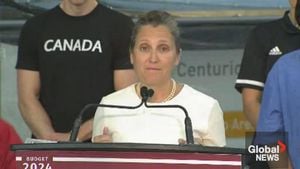Donald Trump's anticipated tariff plans are casting a long shadow over the UK economy, with analysts projecting potential losses amounting to £20 billion. According to the Centre for Economics and Business Research (CEBR), the planned implementation of tariffs could significantly curtail the UK's economic output, affecting sectors reliant on transatlantic trade.
The CEBR highlights Trump's proposals to impose steep tariffs of 60% on Chinese goods and 20% on other imports as elements of his strategy to bolster U.S. domestic industries. If these tariffs go unopposed, the researchers estimate they could trim the UK's Gross Domestic Product (GDP) by 0.9% by the end of Trump's possible term, translating to the staggering figure of £20 billion—calculated based on the country's economic performance data from 2023.
Such economic pressures are compounded by the UK's position as the second-largest trading partner with the U.S., following the European Union. During the year leading up to June 2024, the UK exported approximately £188.2 billion worth of goods and services to the U.S., covering various sectors including cars, aviation components, and pharmaceuticals. All of these industries could potentially face increased costs if tariffs are implemented, which could lead to higher prices for consumers and reduced profits for businesses.
The arrangement poses not only direct economic threats but risks of retaliatory tariffs as well. Past experience during Trump's first term saw these scenarios play out, where trade tensions escalated and led to surging oil prices, among other disruptions. The CEBR noted, “The re-election of Donald Trump could reshape global dynamics, particularly in trade, energy, and environmental policy,” which are areas where the UK has seen notable growth.
While the prospect of tariffs raises concerns, it also opens discussions about the UK’s approach to trade agreements. Economists are urging government officials to negotiate free trade agreements with the U.S. as means of reducing potential tariffs. Yet, the pathway to such agreements is fraught with complexity, largely due to longstanding disputes over food safety standards. Notably, issues surrounding U.S. practices such as the chlorination of chicken have historically posed significant barriers to negotiations.
“Unfortunately, the major sticking point to a deal remains food standards,” the CEBR stated, emphasizing the likelihood of tariffs being leverages by the U.S. to gain concessions on these matters. Their comprehensive assessment also pointed out the possibility of elevated energy prices should tariffs trigger retaliatory moves by other nations impacted by U.S. policies.
Another aspect of the analysis highlights the potential for the UK to position itself as a leader in green technology. With the Trump administration likely to rollback prior environmental investments made under Biden’s Inflation Reduction Act, there is speculation about Britain capitalizing on this shift. Economist Sara Pineros pointed out, “Without strengthening its approach, the UK risks taking all the pain associated with a Trump presidency without realizing the potential gain,” indicating the necessity of proactive measures to boost the UK’s competitive edge amid these developments.
Some believe this is a pivotal moment for UK Chancellor Rachel Reeves to pivot strategically toward fostering growth. Analysts recommend enhancing initiatives surrounding clean energy investments to bridge the gap left by the U.S. shifting focus away from environmental regulation. This burgeoning sector could become beneficial, presenting opportunities for job creation and economic resilience.
The ramifications of Trump's tariff proposals extend beyond just financial statistics. They threaten to reshape the nuanced relationship between the U.K. and the U.S., which has long relied on mutual trade benefits. The potential harm to U.K. manufacturing is of significant concern, especially as industries brace for both rising costs and possible job cuts as exports are curbed. This scenario puts additional pressure on U.K. officials, who must navigate these waters carefully to safeguard their economy.
Looking beyond mere tariff impositions, analysts see broader patterns of protectionism developing worldwide. The current geopolitical climate places added stress on trade relations, as countries react defensively to economic policies set forth by others. At the core of this is the urgency for the UK to build its capabilities, fortify existing partnerships, and explore new markets where trade could flourish uninhibited.
Despite the challenges, there is recognition among the experts of the UK’s resilience and adaptability. While Trump’s policy direction could create economic turbulence, it may also inspire innovative approaches to global trade practices. “The UK must act decisively during this decisive period to redefine itself as a globally competitive market destination,” cautioned Pineros.
Tags: trump, tariffs, uk economy, cebr, gdp, trade negotiations



